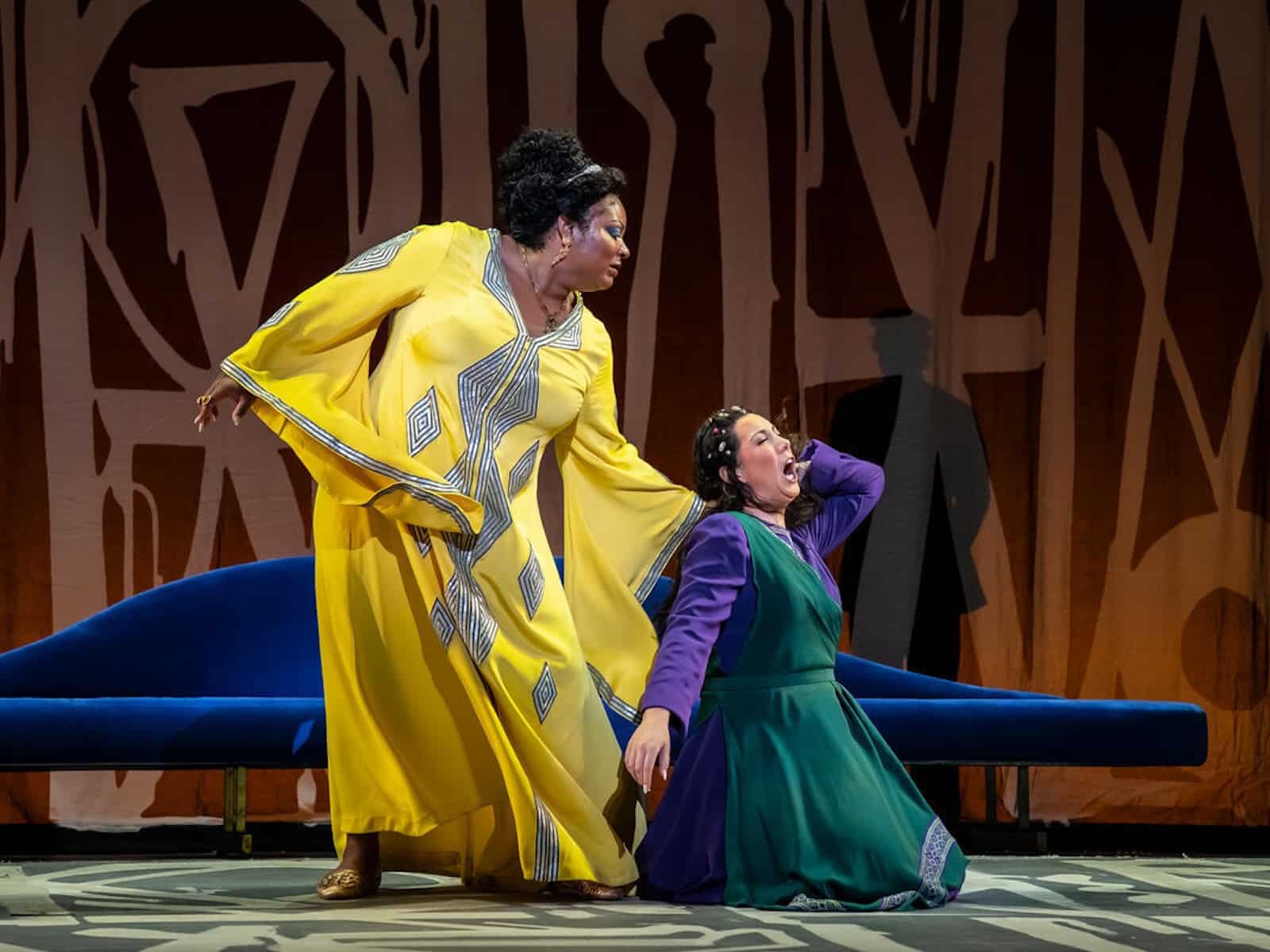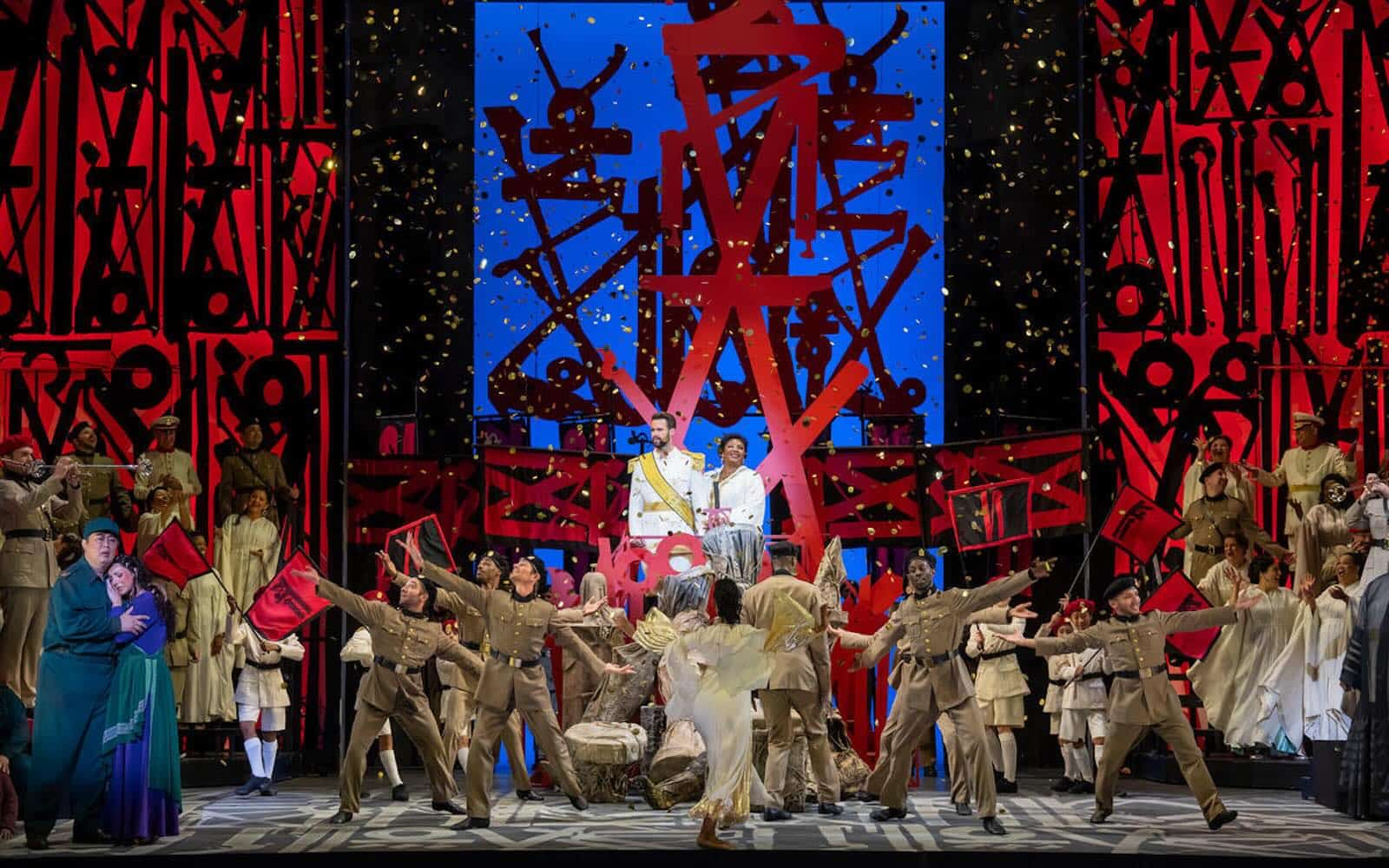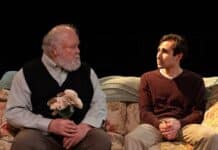It’s hard to believe that Washington National Opera is celebrating its 70th anniversary. For its season opening, Artistic Director Francesca Zambello has brought back her 2017 production of arguably the grandest of grand operas — Giuseppe Verdi’s Aida, best known for its triumphal scene often staged with live elephants. No elephants in this production, folks, but with its massive chorus, a children’s chorus, and integrated ballet numbers by choreographer Jessica Lang, there is plenty of spectacle. Yet Zambello insists the work is a chamber opera, and, truly, its best moments feel as if a camera has zoomed in to capture the inner turmoil of the three main characters, caught in an eternal triangle and torn between passion and duty.
Conceived by Verdi and with the help of librettist Antonio Ghislanzoni, Aida tells the story of an imagined war between Egypt and its neighbor, Nubia, in an unspecified reign during the time of the pharaohs. The work, which premiered in 1871, was fueled by the recent conquests of Napoleon pushing into Egypt and setting off a frenzy of archaeological and artistic interest in Egyptology across Europe.

Zambello has pushed the temporal unspecificity further with this production, and with her creative team and casting has created a vaguely modern world background that could be about any two multicultural nations at war. In this world, there are two kings insisting on their right. One, simply named “The King,” gains the power advantage and wants to keep undesirable foreigners from entering what he sees as his territory. Amonasro, also a king, rules over a poorer people desperately fighting to exist.
Against this background, Amonasro’s daughter, Aida, has become a captive and slave to Egyptian Princess Amneris. Both women are in love with Radamès, an ambitious, patriotic soldier who is soon tapped by the intermediaries of the gods to lead the Egyptian war efforts. Aida tries to hide her feelings from her powerful rival Amneris and is torn between her love for Radamès, her devotion to her father, and love for her people and homeland. Radamès is also torn between his love for Aida and his duty as a soldier. Meanwhile, Amneris uses everything in her power to ensnare the man she loves and humiliate Aida.
In 2017, the contemporary artist known as RETNA got top billing for his contributions to the opera’s overall design, and his calligraphic projections with their nod to Egyptian hieroglyphics seemed bold and innovative. In this rerun, they seemed somewhat arbitrary and finally tiresome. Some shifts in the panel projections and lighting, happening in the middle of a duet or trio, even distracted from the emotional storytelling.
Michael Yeargan’s less flashy scenic design contributions serve the story and have stood the test of time, as have Anita Yavich’s costume designs and Mark McCullough’s original lighting design, repurposed for this revival by Peter W. Mitchell.

The performances are strong and compelling. From the first utterance by Morris Robinson as the High Priest, this superb bass commanded the Kennedy Center’s Opera House. He and Kevin Short, as The King, are DC regulars who have blessedly anchored several WNO productions. Shenyang invests his portrayal of Amonasro with powerful dignity, and his confrontation with Rowley, rejecting her and pushing her to the floor, is a dramatic highlight.
The three leads are double cast, appearing on alternate nights. Jennifer Rowley sang the title role on opening night. Rowley is a true singer-actor, especially gifted in embodying the frailty and emotional vulnerability of the captive slave girl Aida. Her beautiful soprano was both elegant and full of pathos, and her control while singing softly was especially effective, while her physical freedom and full-bodied gestural expressiveness made for a most memorable performance.
Adam Smith’s Radamès is also a most satisfying cast choice. Smith is the epitome of a disciplined military leader, with ramrod physique and steely focus as when he’s poring over maps and plans with his soldiers. He even communicates a soldier’s awkwardness around court functions, especially when pressed into an uneasy and arranged romantic alliance with the King’s daughter, Amneris. But when he is with his love Aida, the depths of his emotional gentleness and passion are revealed through voice and body. Smith has created a most moving emotional arc, and there are many moments, as in the final duet between Radamès and Aida, that are exquisite vocally and emotionally heartbreaking.
Raehann Bryce-Davis has a powerhouse stage presence and a rich mezzo to fill the role of the calculating and sometimes cruel Princess Amneris, who is used to getting her own way. Occasionally, her voice, placed far back, lacks articulation and even gets muffled by the orchestra and other voices. But she, too, has created a most satisfying emotional arc, and when her breaking point comes in the final act, she stoops, legs splayed, as if she would dig and bury herself in the earth. This is the moment she realizes the irreversible, tragic ending she has condemned her love Radamès to, and her sound and physicality combined make for one of the great dramatic moments in this opera or any in my experience.
The Washington National Opera Chorus and orchestra produce a great sound under Conductor Kwamé Ryan. However, gathering this many people on stage at once sometimes feels static and blocky, especially with a simultaneously staged ballet in place of the iconic triumphant march (with elephants).The opera speaks to our times in several ways. Bringing the production of Aida to the Kennedy Center Opera House might signal, intentionally or not, that respect should be given to other sovereign states and that kings wielding power are likely to have tragic consequences in their collateral damage. Its message might also suggest that we should all work for peace through love. After all, what is life without love — or opera?
Running Time: Three hours with a 25-minute intermission.
Aida plays through November 2, 2025, in the Opera House at The Kennedy Center for the Performing Arts, 2700 F St NW, Washington, DC. Purchase tickets (starting at $65.55) online or by calling (202) 467-4600 or toll-free at (800) 444-1324. Box office hours are Monday-Saturday, 10 am-9 pm, and Sunday, 12 pm-9 pm. A limited number of $39 Rush tickets will be available for every performance at the Kennedy Center Box Office the day of the performance. Rush tickets become available 2 hours prior to each performance.
The program is online here.
Directed by Francesca Zambelo. Conducted by Kwamé Ryan. Artistic Design: RETNA, Scenic Designer: Michael Yeargan. Original Lighting Designer: Mark McCullough. Revival Lighting Designer: Peter W. Mitchell. Costume Designer: Anita Yavich. Choreographer: Jessica Lang. Fight Master: Casey Kaleba.
Cast for opening night: Jennifer Rowley, Raehann Bryce-Davis, Adam Smith, Shenyang, Morris Robinson, Kevin Short, Dwayne Brown, Jenelle Figgins, Lauren Carroll, Nicholas Huff, and the Choruses and Orchestra of the Washington National Opera.



